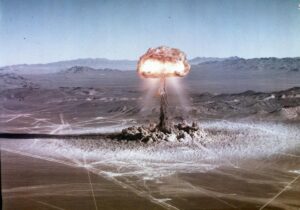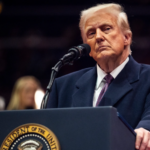
By John Fairlamb, Ph.D., Defense Opinion Writer.
Restarting explosive nuclear weapons testing, or even for political reasons conducting tests that don’t generate a nuclear yield, is unnecessary and counterproductive. It would generate significant political, environmental and humanitarian costs and undermine decades of arms-control norms and progress limiting the proliferation of nuclear weapons.
President Trump has raised the specter of renewed nuclear weapons testing. He said on Truth Social shortly before his meeting with Chinese President Xi Jinping in late October that, “Because of other countries’ testing programs, I have instructed the Department of War to start testing our Nuclear Weapons on an equal basis.”
This short and unexpected statement quickly generated confusion over whether the president meant resuming explosive nuclear testing, which the U.S. halted several decades ago, or the testing of nuclear delivery systems like Russia and China have conducted recently.
After this cryptic remark about a highly technical and potentially hot button issue generated confusion in the media, in Congress and even in the White House, Energy Secretary Chris Wright somewhat clarified that the weapons testing President Trump ordered will not include nuclear explosions.
“I think the tests we’re talking about right now are system tests. These are not nuclear explosions. These are what we call noncritical explosions,” he said.
To be clear, “explosive nuclear testing” means actual nuclear detonations, either above ground or underground, as opposed to computer simulations, sub-critical tests or tests of nuclear delivery systems such as missiles or bombers.
The major nuclear actors and their current policies
Because the president highlighted unspecified testing actions of several other states as a trigger for a possible U.S. policy change, here’s a summary of the explosive nuclear testing policies of the relevant nuclear-armed states.
United States: The U.S. has observed a moratorium on nuclear explosive tests since 1992, and official U.S. policy remains that it currently has no technical need to resume such testing. The U.S. has signed (but not ratified) the Comprehensive Test Ban Treaty (CTBT).
Russia: Russia revoked its ratification of the CTBT in 2023, but it remains a signatory. Current policy is that Russia reserves the option to resume nuclear explosive tests if the United States does so first.
China: China has declared it is committed to a moratorium on nuclear testing, and a 1996 IAEA communication stated that China would “ start a moratorium on nuclear testing effective from 30 July 1996.” Chinese government statements reaffirm statements that it “has faithfully honored its moratorium on nuclear testing” and supports entry into force of the CTBT and the international test ban regime.
North Korea: North Korea has conducted six confirmed nuclear explosive tests between 2006 and 2017. After 2017, North Korea announced it would halt explosive testing, although the test tunnels have reportedly been repaired and North Korea remains “postured” to conduct a seventh test at a time of its choosing.
The many reasons not to do explosive testing
Restarting explosive nuclear tests could trigger a new round of nuclear proliferation, because a nuclear test by one state would likely encourage others to test and develop new designs, weakening global non-proliferation norms.
Political & diplomatic costs would likely result. Testing would break longstanding moratoria (many states adhere to the 1963 Limited Test Ban Treaty norms) and invite regional arms races. In support of its nuclear nonproliferation policy, the U.S. has been a leader in encouraging and enforcing U.N. sanctions against North Korea for its reckless testing programs and resuming testing would undermine these efforts.
There could be serious verification and escalation risks. Explosive nuclear device tests raise tensions and can create crises and miscalculation due to misunderstandings of the testing state’s intentions.
Humanitarian and environmental harm would result. Historically, atmospheric tests and even underground blasts have caused long-term health and environmental damage, population displacement, groundwater contamination and seismic effects.
The U.S. has alternatives that make explosive tests unnecessary. U.S. nuclear labs and the National Nuclear Security Administration (NNSA) rely instead on the “Stockpile Stewardship Program,” which uses sub-critical experiments (i.e., tests that do not generate a nuclear yield), advanced modeling and simulation and material science experiments to certify weapons.
The Department of Energy, which is responsible for maintaining the nuclear stockpile, and the NNSA, a semi-autonomous agency under the U.S. Department of Energy, are on record that they have no technical need to resume explosive testing to ensure the U.S. nuclear stockpile is safe, secure, reliable and effective.
Underscoring just how unnecessary explosive nuclear tests are, the officer in line to head the command that provides strategic nuclear deterrence says that the U.S. nuclear arsenal is ready if necessary. During his recent confirmation hearing, Vice Adm. Richard Correll, the Trump administration’s nominee to head U.S. Strategic Command, told the Senate Armed Services Committee he is “absolutely confident” in the reliability of the nation’s nuclear arsenal — which the command last certified last January.
John Fairlamb, Ph.D., is a retired Army colonel who served for 45 years as a commissioned officer and Department of the Army civilian in a variety of joint service positions formulating and implementing national security strategies and policies. His doctorate is in comparative defense policy analysis.

Are you a Defense Daily reader with a thought-provoking opinion on a defense issue? We want to hear from you.
- We welcome submissions of opinion articles on national security, defense spending, weapons systems and related areas.
- We welcome submissions from lawmakers, administration officials, industry representatives, military officials, academics, think tank experts, congressional candidates, international experts and others on issues important to the national defense community.
- We welcome a diverse range of opinions all along the political spectrum.
- Email: editor@DefenseOpinion.com













